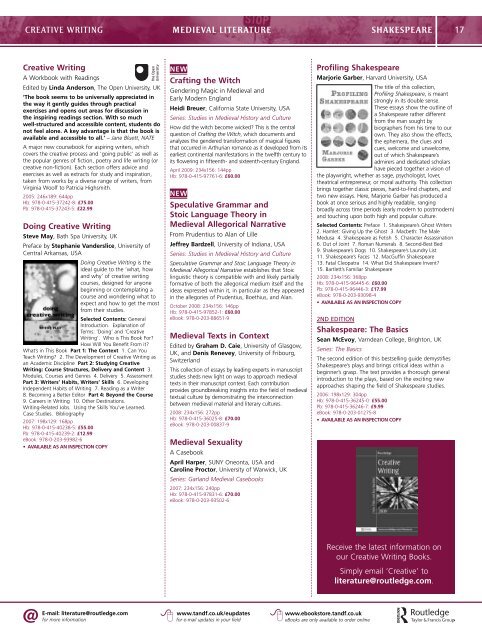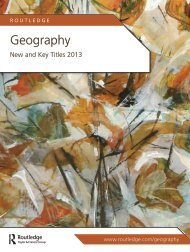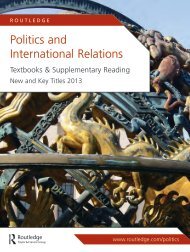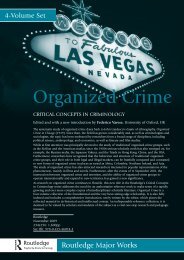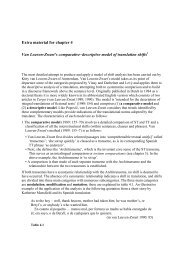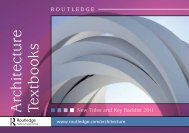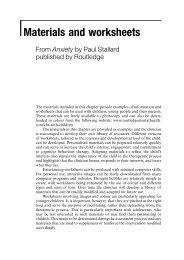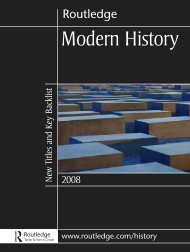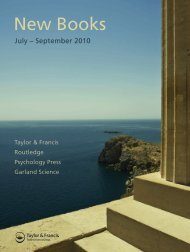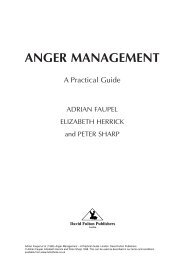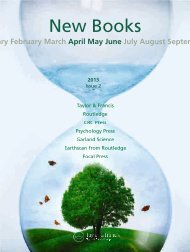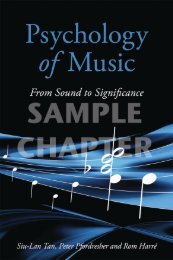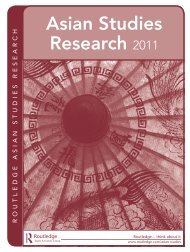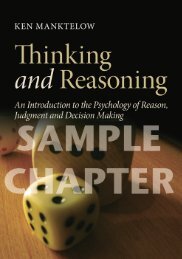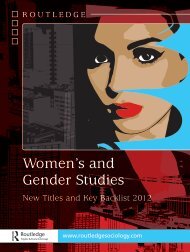Literature Catalogue 2009 (UK) - Routledge
Literature Catalogue 2009 (UK) - Routledge
Literature Catalogue 2009 (UK) - Routledge
Create successful ePaper yourself
Turn your PDF publications into a flip-book with our unique Google optimized e-Paper software.
CREATIVE WRITING MEDIEVAL LITERATURE SHAKESPEARE 17<br />
Creative Writing<br />
A Workbook with Readings<br />
Edited by Linda Anderson, The Open University, <strong>UK</strong><br />
‘The book seems to be universally appreciated in<br />
the way it gently guides through practical<br />
exercises and opens out areas for discussion in<br />
the inspiring readings section. With so much<br />
well-structured and accessible content, students do<br />
not feel alone. A key advantage is that the book is<br />
available and accessible to all.’ – Jane Bluett, NATE<br />
A major new coursebook for aspiring writers, which<br />
covers the creative process and ‘going public’ as well as<br />
the popular genres of fiction, poetry and life writing (or<br />
creative non-fiction). Each section offers advice and<br />
exercises as well as extracts for study and inspiration,<br />
taken from works by a diverse range of writers, from<br />
Virginia Woolf to Patricia Highsmith.<br />
2005: 246x189: 644pp<br />
Hb: 978-0-415-37242-8: £75.00<br />
Pb: 978-0-415-37243-5: £22.99<br />
Doing Creative Writing<br />
Steve May, Bath Spa University, <strong>UK</strong><br />
Preface by Stephanie Vanderslice, University of<br />
Central Arkansas, USA<br />
Doing Creative Writing is the<br />
ideal guide to the ‘what, how<br />
and why’ of creative writing<br />
courses, designed for anyone<br />
beginning or contemplating a<br />
course and wondering what to<br />
expect and how to get the most<br />
from their studies.<br />
Selected Contents: General<br />
Introduction. Explanation of<br />
Terms: ‘Doing’ and ‘Creative<br />
Writing’. Who is This Book For?<br />
How Will You Benefit From it?<br />
What’s in This Book Part 1: The Context 1. Can You<br />
Teach Writing? 2. The Development of Creative Writing as<br />
an Academic Discipline Part 2: Studying Creative<br />
Writing: Course Structures, Delivery and Content 3.<br />
Modules, Courses and Genres 4. Delivery 5. Assessment<br />
Part 3: Writers’ Habits, Writers’ Skills 6. Developing<br />
Independent Habits of Writing 7. Reading as a Writer<br />
8. Becoming a Better Editor Part 4: Beyond the Course<br />
9. Careers in Writing 10. Other Destinations.<br />
Writing-Related Jobs. Using the Skills You’ve Learned.<br />
Case Studies. Bibliography<br />
2007: 198x129: 168pp<br />
Hb: 978-0-415-40238-5: £55.00<br />
Pb: 978-0-415-40239-2: £12.99<br />
eBook: 978-0-203-93982-6<br />
• AVAILABLE AS AN INSPECTION COPY<br />
NEW<br />
Crafting the Witch<br />
Gendering Magic in Medieval and<br />
Early Modern England<br />
Heidi Breuer, California State University, USA<br />
Series: Studies in Medieval History and Culture<br />
How did the witch become wicked? This is the central<br />
question of Crafting the Witch, which documents and<br />
analyzes the gendered transformation of magical figures<br />
that occurred in Arthurian romance as it developed from its<br />
earliest continental manifestations in the twelfth century to<br />
its flowering in fifteenth- and sixteenth-century England.<br />
April <strong>2009</strong>: 234x156: 144pp<br />
Hb: 978-0-415-97761-6: £60.00<br />
NEW<br />
Speculative Grammar and<br />
Stoic Language Theory in<br />
Medieval Allegorical Narrative<br />
From Prudentius to Alan of Lille<br />
Jeffrey Bardzell, University of Indiana, USA<br />
Series: Studies in Medieval History and Culture<br />
Speculative Grammar and Stoic Language Theory in<br />
Medieval Allegorical Narrative establishes that Stoic<br />
linguistic theory is compatible with and likely partially<br />
formative of both the allegorical medium itself and the<br />
ideas expressed within it, in particular as they appeared<br />
in the allegories of Prudentius, Boethius, and Alan.<br />
October 2008: 234x156: 146pp<br />
Hb: 978-0-415-97852-1: £60.00<br />
eBook: 978-0-203-88651-9<br />
Medieval Texts in Context<br />
Edited by Graham D. Caie, University of Glasgow,<br />
<strong>UK</strong>, and Denis Renevey, University of Fribourg,<br />
Switzerland<br />
This collection of essays by leading experts in manuscript<br />
studies sheds new light on ways to approach medieval<br />
texts in their manuscript context. Each contribution<br />
provides groundbreaking insights into the field of medieval<br />
textual culture by demonstrating the interconnection<br />
between medieval material and literary cultures.<br />
2008: 234x156: 272pp<br />
Hb: 978-0-415-36025-8: £70.00<br />
eBook: 978-0-203-00837-9<br />
Medieval Sexuality<br />
A Casebook<br />
April Harper, SUNY Oneonta, USA and<br />
Caroline Proctor, University of Warwick, <strong>UK</strong><br />
Series: Garland Medieval Casebooks<br />
2007: 234x156: 240pp<br />
Hb: 978-0-415-97831-6: £70.00<br />
eBook: 978-0-203-93502-6<br />
Profiling Shakespeare<br />
E-mail: literature@routledge.com www.tandf.co.uk/eupdates<br />
www.ebookstore.tandf.co.uk<br />
for more information for e-mail updates in your field<br />
eBooks are only available to order online<br />
Marjorie Garber, Harvard University, USA<br />
The title of this collection,<br />
Profiling Shakespeare, is meant<br />
strongly in its double sense.<br />
These essays show the outline of<br />
a Shakespeare rather different<br />
from the man sought by<br />
biographers from his time to our<br />
own. They also show the effects,<br />
the ephemera, the clues and<br />
cues, welcome and unwelcome,<br />
out of which Shakespeare’s<br />
admirers and dedicated scholars<br />
have pieced together a vision of<br />
the playwright, whether as sage, psychologist, lover,<br />
theatrical entrepreneur, or moral authority. This collection<br />
brings together classic pieces, hard-to-find chapters, and<br />
two new essays. Here, Marjorie Garber has produced a<br />
book at once serious and highly readable, ranging<br />
broadly across time periods (early modern to postmodern)<br />
and touching upon both high and popular culture.<br />
Selected Contents: Preface 1. Shakespeare’s Ghost Writers<br />
2. Hamlet: Giving Up the Ghost 3. Macbeth: The Male<br />
Medusa 4. Shakespeare as Fetish 5. Character Assassination<br />
6. Out of Joint 7. Roman Numerals 8. Second-Best Bed<br />
9. Shakespeare’s Dogs 10. Shakespeare’s Laundry List<br />
11. Shakespeare’s Faces 12. MacGuffin Shakespeare<br />
13. Fatal Cleopatra 14. What Did Shakespeare Invent?<br />
15. Bartlett’s Familiar Shakespeare<br />
2008: 234x156: 368pp<br />
Hb: 978-0-415-96445-6: £60.00<br />
Pb: 978-0-415-96446-3: £17.99<br />
eBook: 978-0-203-93098-4<br />
• AVAILABLE AS AN INSPECTION COPY<br />
2ND EDITION<br />
Shakespeare: The Basics<br />
Sean McEvoy, Varndean College, Brighton, <strong>UK</strong><br />
Series: The Basics<br />
The second edition of this bestselling guide demystifies<br />
Shakespeare’s plays and brings critical ideas within a<br />
beginner’s grasp. The text provides a thorough general<br />
introduction to the plays, based on the exciting new<br />
approaches shaping the field of Shakespeare studies.<br />
2006: 198x129: 304pp<br />
Hb: 978-0-415-36245-0: £55.00<br />
Pb: 978-0-415-36246-7: £9.99<br />
eBook: 978-0-203-01275-8<br />
• AVAILABLE AS AN INSPECTION COPY<br />
Receive the latest information on<br />
our Creative Writing Books.<br />
Simply email ‘Creative’ to<br />
literature@routledge.com.


